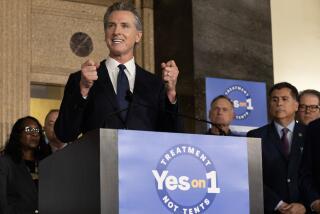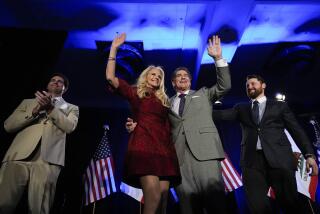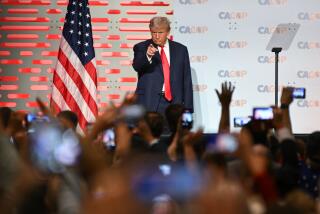In Front-Loaded Primary System, Money Is the Overwhelming Winner
- Share via
DES MOINES — In Iowa this summer, Republican presidential contenders are as thick as fireflies. Parents are teaching their children to look twice for campaign buses before crossing the streets. The incessant candidate meetings have created such a space crunch that George W. Bush and Steve Forbes are competing to build new town halls for communities that are overbooked.
OK, maybe those are slight exaggerations. But Republican candidates have invaded Iowa at a pace this month that invites hyperbole.
They are swarming the state to build support for a straw poll of GOP activists Aug. 14 in Ames (home of Iowa State University). No actual delegates for next year’s GOP national convention are at stake; it’s a purely symbolic showdown. Yet the straw poll has become a virtual life-and-death event for much of the Republican field. The reason helps explain why the modern system for picking presidential nominees is teetering on collapse.
The contemporary presidential primary system, which dates back roughly to the early 1970s, has tended to operate in two stages. In the first, which traditionally has lasted through mid-February, the field is winnowed by contests in small states. Then the surviving contenders--the finalists--battle through the bigger states to determine the nominee.
It’s the winnowing stage that’s ominously imploding.
Up until now, the responsibility for narrowing the field has been shared between the so-called money primary--the race for campaign cash in the year before actual voting--and the citizens of Iowa and New Hampshire, the first two key contests on the primary calendar. This system balanced the influence of donors and voters. It also provided an opportunity, even if a slim one, for dark-horse contenders without much money.
Here’s why. Under the old calendar, the nominating contest ran from early February until June. That left underfunded candidates enough time to raise money to compete in the decisive larger states if they could first break through in Iowa and New Hampshire, where it doesn’t cost that much to run.
That’s what Gary Hart did when he nearly swiped the Democratic nomination from front-runner Walter F. Mondale in 1984. Hart had raised only $1.5 million by New Hampshire, but after he upset Mondale there, he raised enough to compete all the way through California in June. Jimmy Carter leveraged the same strategy all the way to the White House in 1976.
But such an approach is virtually impossible today because so many states have crammed their primaries into a six-week roller-coaster after Iowa and New Hampshire. Even if a dark-horse candidate does well in the first two contests, the compression of the calendar leaves him without enough time to replenish his checkbook before he must compete in the large and expensive states--from New York to Florida to California--that can decide the nomination.
That has compelled everyone (except the self-financed Forbes) to try to raise virtually all of their money this year. And that has given the people who write the checks more power to decide who lives and dies. (The problem is less acute among Democrats only because their race was preemptively winnowed, partly by money concerns, to the point where just Vice President Al Gore and former Sen. Bill Bradley are competing for cash.)
The rising clout of money is directly linked to the lemming-like rush of states to increase their say in choosing the nominees by “front-loading” their primaries into a narrow window after Iowa and New Hampshire. In elbowing their way to the front of the line, states hoped to increase the influence of their own voters. But collectively their actions have only shifted power from voters in all the states toward donors.
Paradoxically, that is evident even in Ames, which offers the first chance for voters to cast a judgment on the 2000 GOP field. In some respects, the straw poll demonstrates the continued vitality of the grass-roots democratic tradition that has given Iowa and New Hampshire their unique role in selecting our presidents. Candidates are still making their case to small groups in American Legion halls and even standing on soapboxes in town squares on sleepy summer afternoons.
But the unusual importance of the straw poll this year actually testifies to the growing power of the donors. Above all, what has heightened the stakes is Bush’s unprecedented dominance of the money primary. Ames offers the candidates chasing the Texas governor perhaps their last real chance this year to jump-start their lagging fund-raising by demonstrating a spark of political momentum.
In other words, Ames is a political contest whose meaning is primarily defined by its impact on the financial contest. Commentator Patrick J. Buchanan has said that the grim reaper will be waiting outside the convention center in Ames for those candidates who fare badly. But it’s really the repo man who will be tapping the losers on the shoulders.
Poor showings in Ames could force some debt-laden hopefuls to drop out (speculation centers on former Tennessee Gov. Lamar Alexander and former Vice President Dan Quayle) and squeeze the already modest fund-raising for others (former Red Cross chief Elizabeth Hanford Dole, activist Gary Bauer and Buchanan) near the choking point. Only millionaire publisher Forbes (who can write his own checks) and Sen. John McCain of Arizona (who’s sitting out Iowa to focus on New Hampshire) may have somewhat less at stake. With Rep. John R. Kasich of Ohio already abandoning the race for lack of funds, most of the original GOP field could be comatose before any voter casts a ballot that counts.
Under any rules, Bush would be a formidable candidate. He is an engaging campaigner with an attractive center-right message. In any system, his extraordinary fund-raising would be intimidating. But in this system, on this campaign calendar, his bankroll looks almost insurmountable.
Money truly matters: Since 1980, the candidate who has raised the most money before the voting begins has almost always won the nomination in both parties. But the frenzied compression of the primaries is giving the other contenders--not to mention the voters--less and less chance to challenge the verdict of the money primary.
Unless the parties reverse the front-loading and return to a more deliberative primary calendar, the power to pick their nominees will continue to drain away from coffee shops in Iowa and New Hampshire to $1,000-a-plate dinners in New York and Los Angeles.
*
Ronald Brownstein’s column appears in this space every Monday.
*
See current and past Brownstein columns on The Times’ Web site at: https://www.latimes.com/brownstein
More to Read
Get the L.A. Times Politics newsletter
Deeply reported insights into legislation, politics and policy from Sacramento, Washington and beyond. In your inbox twice per week.
You may occasionally receive promotional content from the Los Angeles Times.










